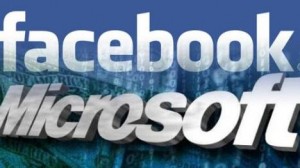 Microsoft and Facebook, which have struck a variety of business, technology and advertising agreements in recent years, announced yesterday a deal related to patents AOL recently sold.
Microsoft and Facebook, which have struck a variety of business, technology and advertising agreements in recent years, announced yesterday a deal related to patents AOL recently sold.
As part of the deal, Facebook has agreed to buy a portion of the patents Microsoft recently acquired from AOL. Facebook will pay Microsoft US$550 million in cash for around 650 AOL patents and patent applications, plus a license to the AOL patents and patent applications Microsoft will buy.
Earlier this month, Microsoft agreed to pay $1.06 billion in cash to own or assign around 925 AOL patents and obtain a nonexclusive license to more than 300 patents AOL is retaining.
Areas covered by the patents in question include online advertising, search, content generation and management, social networking, mapping, multimedia and streaming, and security.
When the Facebook deal closes, Microsoft will own around 275 AOL patents and patent applications, a license to the 650 Facebook will own and a license to the around 300 patents AOL retained.
Microsoft’s deal with Facebook allows Microsoft to recover more than half of what it spent in the AOL deal, while achieving its goals, Microsoft’s General Counsel Brad Smith said in a statement.
Smith’s counterpart at Facebook, Ted Ullyot, said in the statement that this deal is another step in the company’s process to build a patent portfolio.
Facebook and Microsoft partner in a variety of areas, as they battle common foe Google in markets including social networking, search, online advertising, mobile and cloud applications.
It has become popular among large IT vendors to spend considerable amounts of money bulking up their patent holdings as proactively defensive measures against possible intellectual property lawsuits.
In Facebook’s case, it is currently facing such a lawsuit from Yahoo, which alleges Facebook has infringed 10 of its patents. The lawsuit, filed in March, states that the infringed-upon patents cover areas like online advertising. Weeks later Facebook fired back with a patent-infringement countersuit against Yahoo.
A Yahoo spokeswoman said via email that Facebook’s patent acquisition doesn’t change Yahoo’s allegations.
“Companies who purchase patents are often working from a position of weakness and take these actions to strengthen their portfolio. We see today’s announcement as a validation of our case against Facebook,” she said.
However, Gartner analyst Brian Blau sees the move as a positive one for Facebook, particularly as it prepares for its upcoming IPO.
By beefing up its patent portfolio, which has been thin until now, Facebook not only boosts its legal position against Yahoo and other future plaintiffs, but it also makes itself more attractive to investors it needs to attract as a soon-to-be publicly traded company.
“What Facebook did was boost its defenses for all of those questions,” Blau said in a phone interview.
Microsoft’s motivation seems to have been that it was one of a few companies with the resources to acquire the AOL patents, even though it didn’t really need them, he said.
However, Microsoft knew it had a willing buyer for those patents waiting in the wings, in the form of Facebook, so Microsoft was confident it could quickly “flip” them over to Facebook, he said.
Of course, for Facebook and all other big Internet players, a patent portfolio is just a defensive tool to protect their intellectual property, while success comes from continued innovation and execution, Blau said.





